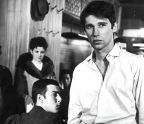
Officially, Bertrand Bonello’s last three features comprise a triptych about youth, but there’s also a shadow interpretation waiting to be made of Nocturama (2016), Zombi Child (2019), and Coma as an extended, eccentric treatise on horror-movie history and aesthetics—call it a self-reflexive Trilogy of Terror. Whatever its debts to Le diable probablement (1977), Nocturama hewed closer to Romero than Bresson, restaging the late-capitalist tragedy of Dawn of the Dead (1978) in a Parisian department store minus any visible zombies, but with the creeping sense of persecution and dread intact. Less successfully, but with true daring, the partially Haitian-set Zombi Child walked with Val Lewton and Jacques Tourneur down the path of mordant, morbid post-colonial allegory, waving at Candyman (1992) and The Craft (1995) along the way. And now, made deep in the throes of COVID lockdown—direct from the director’s own home in Paris—comes the skeleton-crew vision of Coma, which borrows its title from noted technophobe Michael Crichton and its bad vibes from David Lynch, Kurosawa Kiyoshi, and Unfriended (2014), raw materials it duly dunks in a high-speed blender.
That Cuisinart analogy isn’t a throwaway, by the way: Bonello is cinephile enough to remember that Unfriended—one of the great studio B-movies of the new millennium, and uniquely Deleuzian besides—peaked with a possessed kid shoving his hand in a food processor in the midst of a group chat. He pays homage in Coma by having Julia Faure’s eponymously surnamed character, a popular YouTube influencer, do likewise during one of her abstruse yet accessible instructional videos. That Faure’s ever-deadpan Patricia Coma suffers no apparent injury in the process speaks both to her strangely ephemeral, quietly menacing nature (she’s the ghost in Coma’s machine) and the crypto-Surrealist ethos of Bonello’s film, which unfolds as a veritable nocturama: a guided tour through twilight zones plucked from the collective popcultural subconscious. Coma’s dream logic is as old as Jean Cocteau, whose famous maxim that “living is a horizontal fall” comes to mind via Bonello’s relentlessly subdividing structure and recurrent supine imagery. If Patricia Coma and her bizarro self-help bromides suggest a very contemporary sort of internet Svengali, then Louise Labèque’s unnamed, digitally anesthetized protagonist—splayed eternally in her bedroom purgatory, iPhone and laptop at the ready—is a stand-in for her cozily dissociated, habitually doom-scrolling constituency, glued to her screens with eyes wide shut.
opens in epistolary mode, with a long passage of onscreen text (projected silently overtop of the climax of) announcing the project as a dedication to Bonello’s stepdaughter, Anne. It’s an overture which obliges us to consider that Labèque is playing a version of same, but either way, “The Young Girl,” as she’s referred to in the credits, is not a particularly dynamic presence. In making the inevitable comparison between and Jane Schoenbrun’s recent screen-life freak-out (2021)—a movie drawing from a similar well of formal and thematic influences—the major difference comes in the films’ respective approaches to character and performance. Where Schoenbrun syncs her film to the erratic rhythms of her doll-eyed pre-teen lead Anna Cobb, Bonello uses Labèque’s passive, statuesque blankness as a foil to his own formal gamesmanship.




